The Duplicator: Instant Cloning Would Make the World Economy Explode
This is the second post in a series explaining my view that we could be in the most important century of all time. Here's the roadmap for this series.
- The first piece in this series discusses our unusual era, which could be very close to the transition between an Earth-bound civilization and a stable galaxy-wide one.
- Future pieces will discuss how "digital people" - and/or advanced AI - could be key for this transition.
- This piece explores a particularly important dynamic that could make either digital people or advanced AI lead to explosive productivity.
I explore the simple question of how the world would change if people could be "copied." I argue that this could lead to unprecedented economic growth and productivity. Later, I will describe how digital people or advanced AI could similarly cause a growth/productivity explosion.
When some people imagine the future, they picture the kind of thing you see in sci-fi films. But these sci-fi futures seem very tame, compared to the future I expect.
In sci-fi, the future is different mostly via:
- Shiny buildings, gadgets and holograms.
- Robots doing many of the things humans do today.
- Advanced medicine.
- Souped up transportation, from hoverboards to flying cars to space travel and teleportation.
But fundamentally, there are the same kinds of people we see today, with the same kinds of personalities, goals, relationships and concerns.
The future I picture is enormously bigger, faster, weirder, and either much much better or much much worse compared to today. It's also potentially a lot sooner than sci-fi futures:1 I think particular, achievable-seeming technologies could get us there quickly.
Such technologies could include "digital people" or particular forms of advanced AI - each of which I'll discuss in a future piece.
For now, I want to focus on just one aspect of what these sorts of technology would allow: the ability to make instant copies of people (or of entities with similar capabilities). Economic theory - and history - suggest that this ability, alone, could lead to unprecedented (in history or in sci-fi movies) levels of economic growth and productivity. This is via a self-reinforcing feedback loop in which innovation leads to more productivity, which leads to more "copies" of people, who in turn create more innovation and further increase productivity, which in turn ...
In this post, instead of directly discussing digital people or advanced AI, I'm going to keep things relatively simple and discuss a different hypothetical technology: the Duplicator from Calvin & Hobbes, which simply copies people.
How the Duplicator works
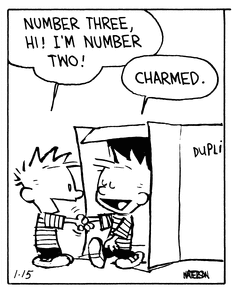
The Duplicator is portrayed in this series of comics. Its key feature is making an instant copy of a person: Calvin walks in, and two identical Calvins walk out.
This is importantly different from the usual (and more realistic) version of "cloning," in which a person's clone has the same DNA but has to start off as a baby and take years to become an adult.2
To flesh this out a bit, I'll assume that:
- The Duplicator allows any person to quickly make a copy of themselves, which starts from the same condition and mental state or from an earlier state (for example, I could make a replica of "Holden as of January 1, 2015").3 Unlike in many sci-fi films, the copies function normally (they aren't evil or soulless or decaying or anything).
- It can be used to make an unlimited number of copies, though each has some noticeable cost of production (they aren't free).4
Productivity impacts
It seems that much of today's economy revolves around trying to make the most of "scarce human capital." That is:
- Some people are "scarce" or "in demand." Extreme examples include Barack Obama, Sundar Pichai, Beyonce Knowles and Jennifer Doudna.5 These people have some combination of skills, experience, knowledge, relationships, reputation, etc. that make it very hard for other people to do what they do. (Less extreme examples would be just about anyone who is playing a crucial role at an organization, hard to replace and often well paid.)
- These people end up overbooked, with far more demands on their time than they can fulfill. Armies of other people end up devoted to saving their time and working around their schedules.
The Duplicator would remove these bottlenecks. For example:
- Copies of Sundar Pichai could work at all levels of Google, armed with their ability to communicate easily with the CEO and make decisions as he would. They could also start new companies.
- Copies of the President of the U.S. could personally meet with any voter who wanted to interview the President, as well as with any Congresspeople or potential appointees or advisors the President didn't have time to meet with. They could deeply study key domestic and international issues and report back to the "original" President.
- Copies of Beyonce could make as many albums as the market could support. They could deeply study and specialize in different musical genres. They could even try living different lifestyles to gain different life experiences, all of which could inform different albums that still all shared Beyonce's personal aesthetic and creativity. There would probably be at least one Beyonce copy whose music people considered better than the original's; that one could further copy herself.
- Copies of Jennifer Doudna could investigate any of the ideas and experiments the original doesn't have time to look into, as well as exploring the many fields she wasn't able to specialize in. There could be Jennifer Doudna copies in physics, chemistry and computer science as well as biology, each collaborating with many other Jennifer Doudna copies.
(The ability to make copies for temporary purposes - and run them at different speeds - could further increase efficiency, as I'll discuss in a future piece about digital people.)
Explosive growth
OK, the Duplicator would make the economy more productive - but how much more productive?
To answer, I'm going to briefly summarize what one might call the "Population growth is the bottleneck to explosive economic growth" viewpoint.
I would highly recommend reading more about this viewpoint at the following links, all of which I think are fascinating:
- The Year The Singularity Was Cancelled (Slate Star Codex - reasonably accessible if you have basic familiarity with economic growth)
- Modeling the Human Trajectory (Open Philanthropy's David Roodman - reasonably accessible blog post, linking to dense technical report)
- Could Advanced AI Drive Explosive Economic Growth? (Open Philanthropy's Tom Davidson - accessible blog post, linking to dense technical report)
Here's my rough summary.
In standard economic models, the total size of the economy (its total output, i.e., how much "stuff" it creates) is a function of:
- How much total "labor" (people doing work) there is in the economy;
- How much "capital" (e.g., machines and energy sources - basically everything except labor) there is in the economy;
- How high productivity is, i.e., how much stuff is created for a given amount of labor and capital. (This is sometimes called "technology.")
That is, the economy gets bigger when (a) there is more labor available, or (b) more capital (~everything other than labor) available, or when (c) productivity ("output per unit of labor/capital") increases.
The total population (number of people) affects both labor and productivity, because people can have ideas that increase productivity.
One way things could theoretically play out in an economy would be:
The economy starts with some set of resources (capital) supporting some set of people (population).

This set of people comes up with new ideas and innovations.

This leads to some amount of increased productivity, meaning there is more total economic output.6
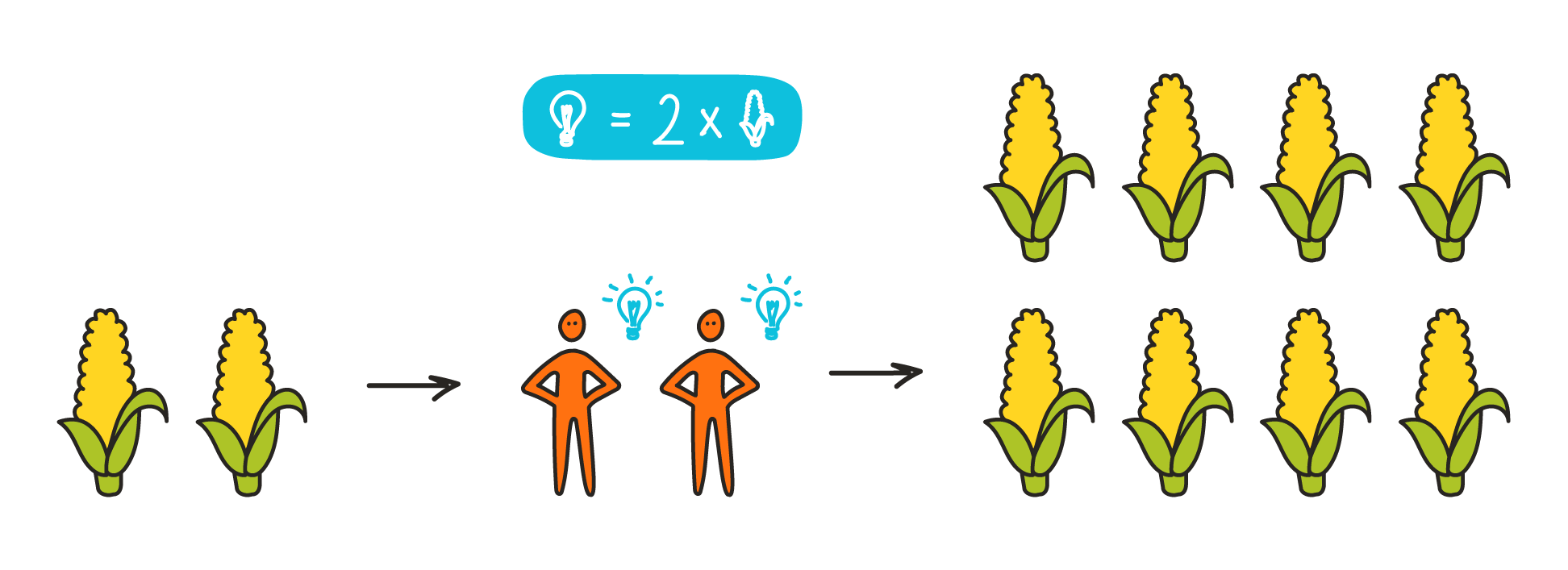
This means people can afford to have more children. They do, and the population grows more quickly.

Because of that population growth, the economy comes up with new ideas and innovations faster than before (since more people means more new ideas).7
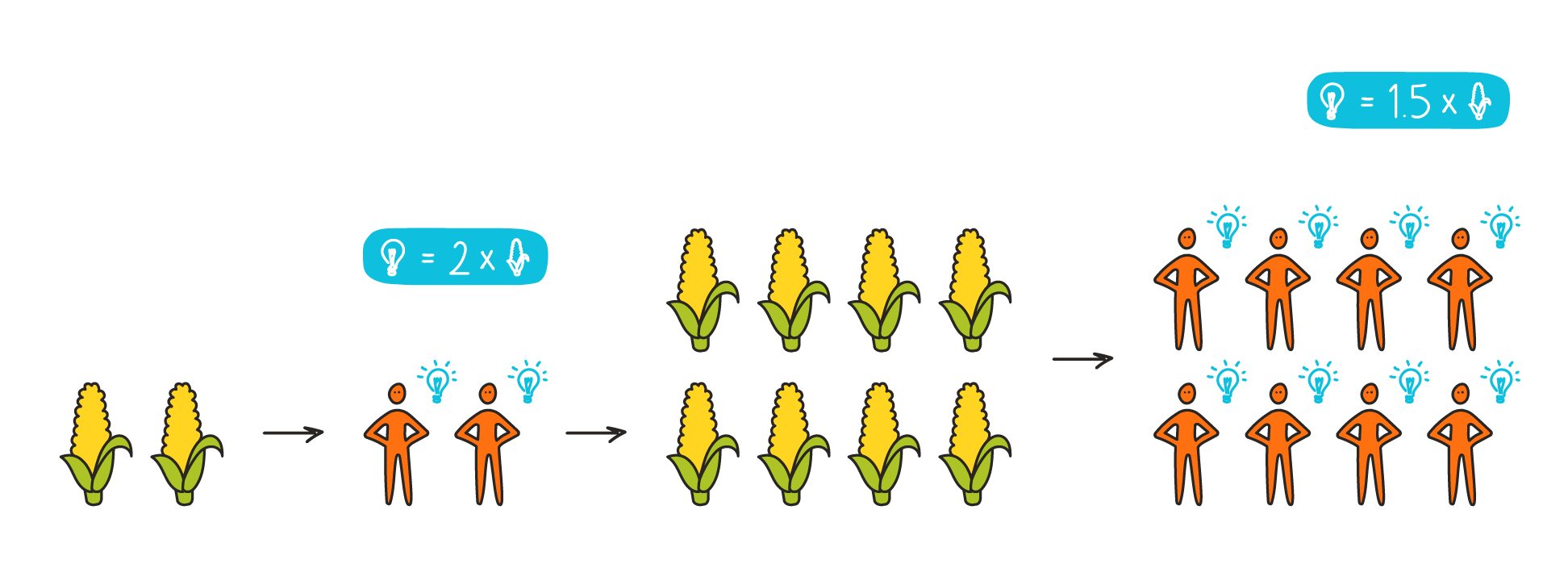
This leads to even more economic output and even faster population growth, in a self-reinforcing loop: more ideas → more output → more people → more ideas→ ....
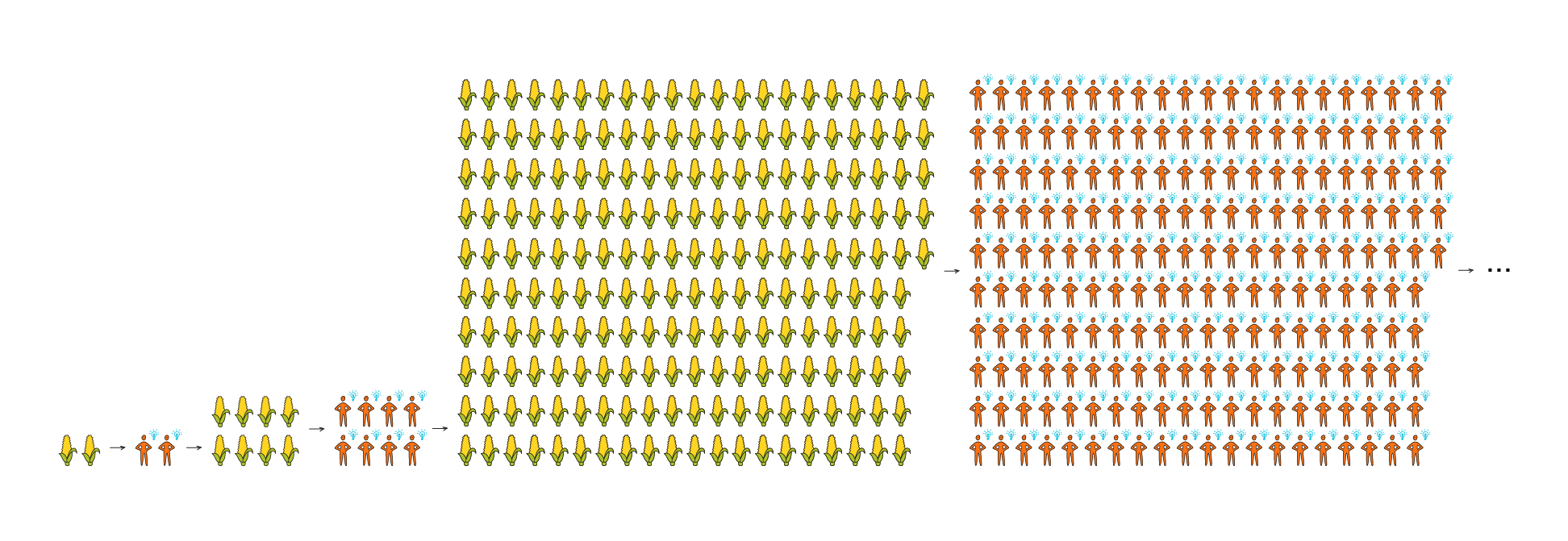
When you incorporate this full feedback loop into economic growth models,8 they predict that (under plausible assumptions) the world economy will see accelerating growth.9 "Accelerating growth" is a fairly "explosive" dynamic in which the economy can go from small to extremely large with disorienting speed.
The pattern of growth predicted by these models seems like a reasonably good fit with the data on the world economy over the last 5,000 years (see Modeling the Human Trajectory, though there is an open debate on this point; I discuss how the debate could change my conclusions here). However, over the last few hundred years, growth has not accelerated; it has been "constant" (a less explosive dynamic) at around today's level.
Why did accelerating growth transition to constant growth?
This change coincided with the demographic transition. In the demographic transition it stopped being the case that having more output -> having more children. Instead, more output just meant richer people, and people actually had fewer children as they became richer. This broke the self-reinforcing loop described above.
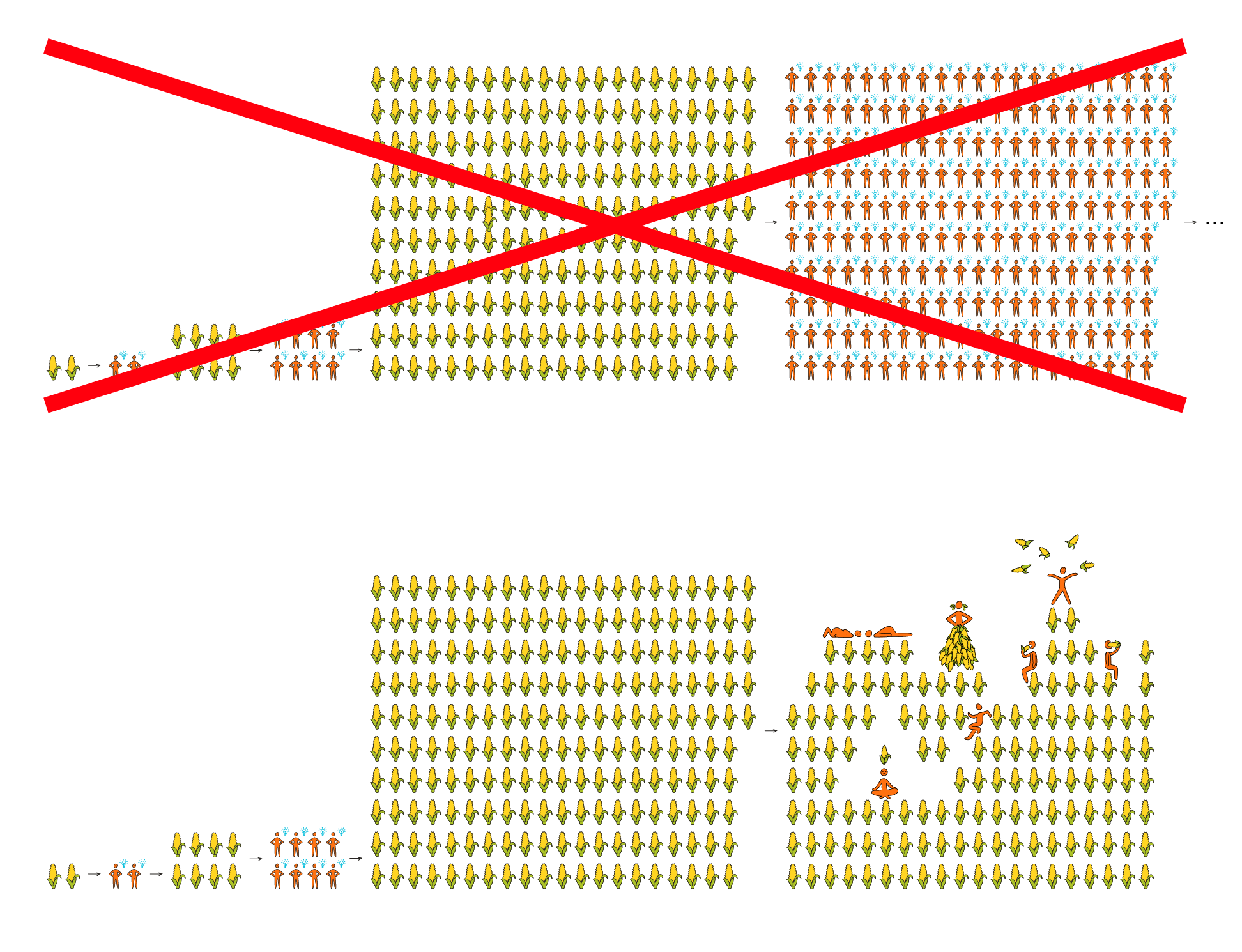
Raising children is a massive investment (of time and personal energy, not just "capital"), and children take a long time to mature. By changing what it takes to grow the population, the Duplicator could restore the accelerating feedback loop.
| Period | Feedback loop? | Pattern of growth |
| Before the demographic transition | Yes: more ideas → more output → more people → more ideas→ | Accelerating growth (economy can go from small to large disorientingly quickly) |
| Since the demographic transition | No: more ideas → more output → |
Constant growth (less explosive) |
| With the Duplicator | Yes: more ideas → more output → more people → more ideas→ | Accelerating growth |
This figure from Could Advanced AI Drive Explosive Economic Growth? illustrates how the next decades might look different with steady exponential growth vs. accelerating growth:
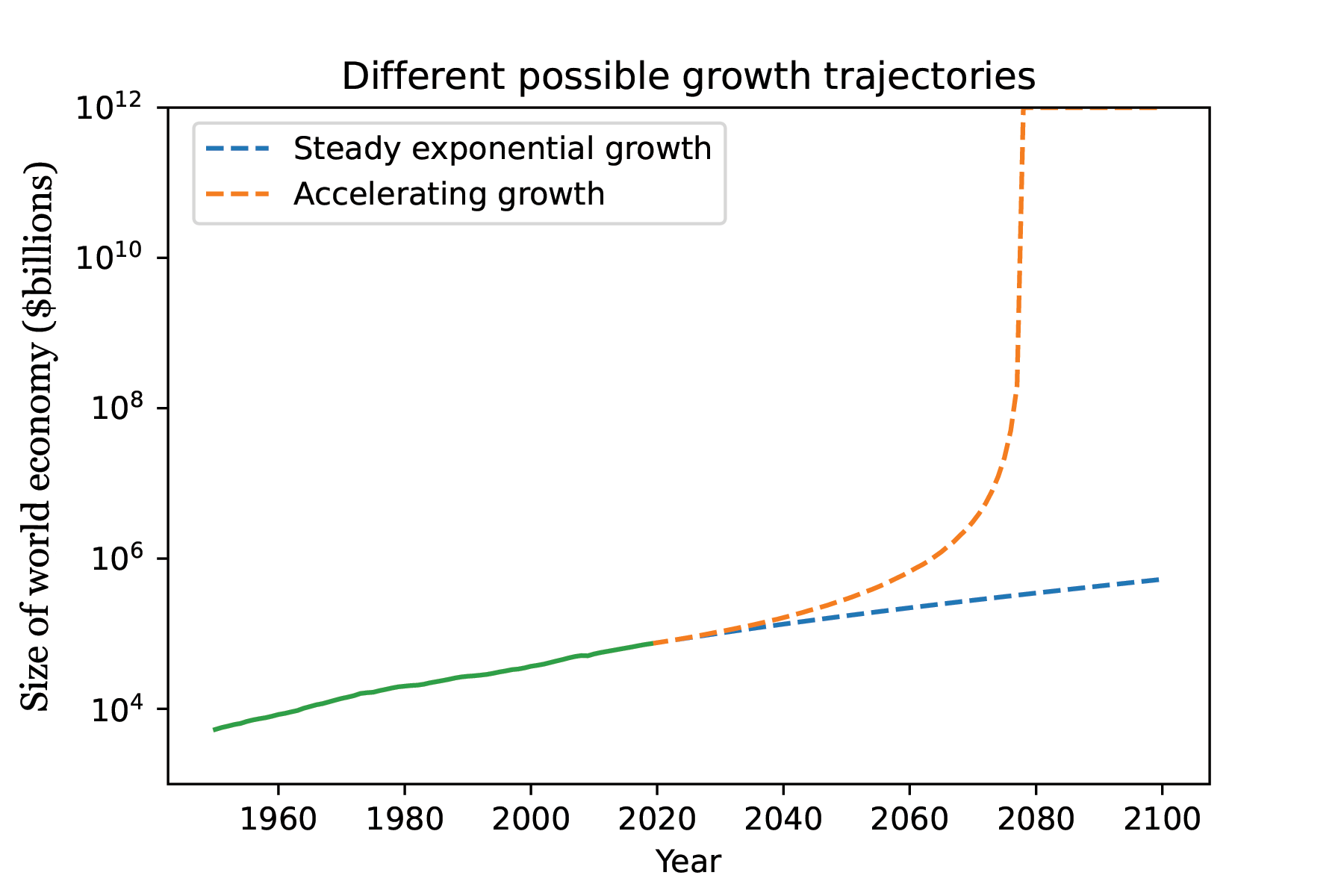
To see more detailed (but simplified) example numbers demonstrating the explosive growth, see footnote.10
If we wanted to guess what a Duplicator might do in real life, we might imagine that it would get back to the kind of acceleration the world economy had historically, which loosely implies (based on Modeling the Human Trajectory) that the economy would reach infinite size sometime in the next century.11
Of course, that can't happen - at some point the size of the economy would be limited by fundamental natural resources, such as the number of atoms or amount of energy available in the galaxy. But in between here and running out of space/atoms/energy/something, we could easily see levels of economic growth that are massively faster than anything in history.
Over the last 100 years or so, the economy has doubled in size every few decades. With a Duplicator, it could double in size every year or month, on its way to hitting the limits.
Depending on how things played out, such productivity could result in an end to scarcity and material need, or in a dystopian race between different people making as many copies of themselves as possible in the hopes of taking over the population. (Or many in-between and other scenarios.)
Conclusion
I think the Duplicator would be a more powerful technology than warp drives, tricorders, laser guns12 or even teleporters. Minds are the source of innovation that can lead to all of those other things. So being cheaply able to duplicate them would be an extraordinary situation.
A harder-to-intuit, but even more powerful, technology would be digital people, e.g., the ability to run detailed simulations of people13 on a computer. Such simulated people could be copied Duplicator-style, and could also be sped up, slowed down, and reset, with virtual environments that were fully controlled.
I think that sort of technology is probably possible, and I expect a world with it to be even wilder than a world with the Duplicator. I'll elaborate on this in the next piece.
Next in series: Digital People Would Be An Even Bigger Deal
Use "Feedback" if you have comments/suggestions you want me to see, or if you're up for giving some quick feedback about this post (which I greatly appreciate!) Use "Forum" if you want to discuss this post publicly on the Effective Altruism Forum.
Footnotes
-
For example, Star Trek's Captain Kirk first takes over the Enterprise in the mid-2200s. I think we could easily see a much more advanced, changed world than that of Star Trek, before 2100. ↩
-
This isn't quite how it works in the comic, but it's how it'll work here. ↩
-
The one in the comic burns out after a few copies, but that one's just a prototype. ↩
-
Biologist who co-invented CRISPR and won a Nobel Prize in 2020. ↩
-
Each idea doubled the amount of corn. ↩
-
A faster-growing population doesn't necessarily mean faster technological advancement. There could be "diminishing returns": the first few ideas are easier to find than the next few, so even as the effort put into finding new ideas goes up, new ideas are found more slowly. (Are Ideas Getting Harder To Find? is a well-known paper on this topic.) More population = faster technological progress if the population is growing faster than the difficulty of finding new ideas is growing. This dynamic is portrayed in a simplified way in the graphic: initially people have ideas leading to doubling of corn output, but later the ideas only lead to a 1.5x'ing of corn output. ↩
-
It's crucial to include the "more output -> more people" step, which is often not there by default, and doesn't describe today's world (but could describe a world with The Duplicator). It's standard for growth models to incorporate the other parts of the feedback loop: more people --> more ideas --> more output. ↩
-
This claim is defended in detail in Could Advanced AI Drive Explosive Economic Growth? ↩
-
We'll start with this economy:

100 people produce 100 units of resources (1 per person). For every 10 units of resources, they're able to create 1 more duplicate (this is just capturing the idea that duplicates are "costly" to create). And the 100 people have 5 new ideas, leading to 5% productivity growth.
Here's year 2:

Now each person produces 1.05 widgets instead of 1, thanks to the productivity growth. And there's another 5% productivity growth.
This dynamic takes some time to "take off," but take off it does:
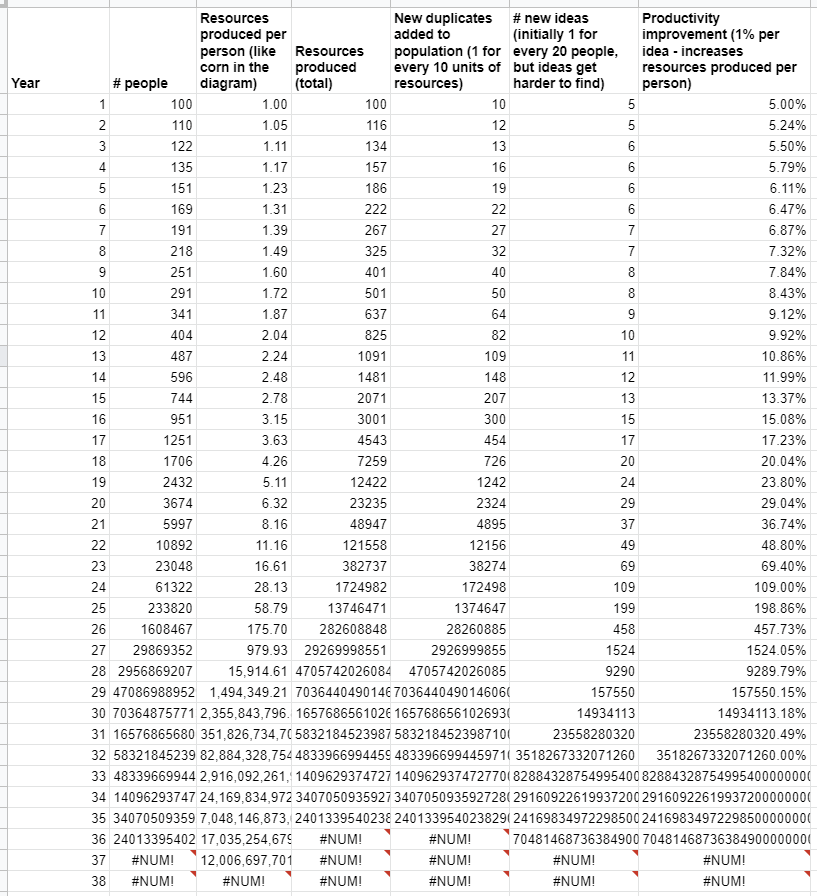
The #NUM!'s at the bottom signify Google Sheets choking on the large numbers.
My spreadsheet includes a version with simply exponentially increasing population; that one goes on for ~1000 years without challenging Google Sheets. So the population dynamic is key here. ↩
-
As noted above, there is an open debate on whether past economic growth actually follows the pattern described in Modeling the Human Trajectory. I discuss how the debate could change my conclusions here; I think there is a case either way for explosive growth this century.↩
-
TBH, I've never been able to figure out why these are better than regular guns. ↩
-
Or of some sort of entity that's properly described as a "descendant" of people, as I'll discuss in the piece on digital people. ↩